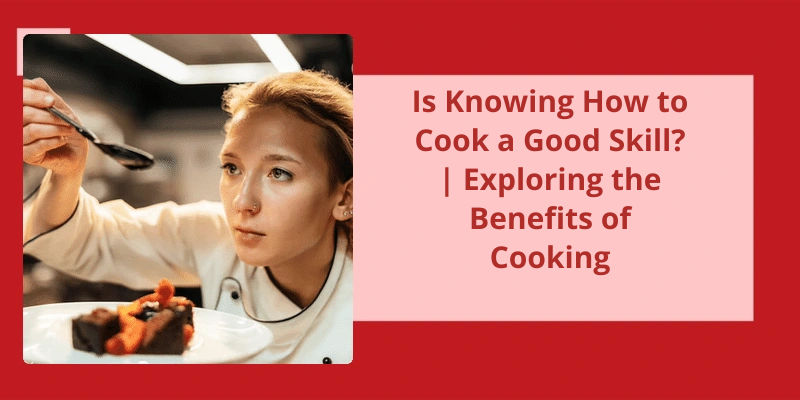Cooking is an art that’s been around for centuries, and today, it remains a vital skill that everyone should possess. It goes beyond just having the ability to follow a recipe; cooking involves knowing how to blend flavours, presenting food in an appealing manner, and catering to the diverse dietary needs of a multicultural society. Although many people might find it daunting at first, learning how to cook is an enjoyable and rewarding experience. It opens up a world of possibilities, helps us explore different cultures, and allows us to feed our minds and bodies in a wholesome and satisfying way. Whether you’re a beginner or an experienced cook, mastering this skill can change your life for the better, and you’ll realise pretty quickly that good food can be just as convenient and quickly available as most of the junk food alternatives.
Is Cooking a Skill or Not?
Cooking is definitely a skill, and like any skill, it takes time, practice and patience to master. From measuring and converting ingredients to understanding various cooking methods and techniques, there’s a lot to learn and perfect in the kitchen. Moreover, cooking isn’t just about following a recipe, it’s about understanding the ingredients and how they work together to create a delicious dish.
For those who doubted the practicality of cooking and it’s relevance in the modern world, it’s worth noting that cooking is a life skill that can benefit everyone. Not only does knowing how to cook mean that you can prepare nutritious meals for yourself and your family, but it also means that you can save money by avoiding takeaways and eating out. Moreover, cooking can help to promote a healthier lifestyle, reduce waste, and foster a sense of community and togetherness when sharing meals with loved ones.
Cooking skills aren’t only important in the culinary industry but also in our daily lives. From preparing a meal for our family and friends to hosting a dinner party, having basic cooking skills is essential. However, cooking skills go beyond just being able to follow a recipe or knowing how to use kitchen appliances. They require patience, attention to detail, creativity, and a passion for food. In this article, we will explore the importance of cooking skills and offer some tips on how to improve them.
How Would You Describe Cooking Skills?
Good cooking skills involve more than just following recipes and knowing how to use kitchen tools. In fact, they require various levels of training, educating, and hands-on experience in the culinary arts. A person with excellent cooking skills knows how to combine flavors and textures to create delicious dishes that reflect their unique vision and culinary style. They’re passionate about food and are always eager to learn new recipes, techniques, and methods to improve their craft.
Communication is another critical cooking skill. A good cook needs to be able to communicate effectively with their team members, customers, and suppliers. They must listen attentively, articulate their ideas clearly, and provide feedback constructively. Also, they must have excellent customer service skills to interact with customers, address their needs and concerns, and provide them with a memorable dining experience.
They’re a combination of technical and interpersonal abilities that require training, education, experience, and passion for food. With these skills, they can create amazing dishes that satisfy the senses, nourish the body, and delight the soul.
The Importance of Presentation in Cooking: How to Plate Dishes and Make Them Visually Appealing to Diners.
Presentation is a crucial aspect of cooking as it can make the difference between an enjoyable or underwhelming dining experience. Plating dishes in an appealing manner enhances the visual appeal, which in turn influences the taste perception of the dish. Knowing how to plate dishes skillfully and creatively will increase the likelihood of diners appreciating and enjoying the meal.
Learning how to cook is really an art that requires time, skill, and, most importantly, patience. Knowing basic cooking techniques can greatly improve one’s cooking skills and lead to a more enjoyable outcome in the kitchen. Some of the essential cooking techniques that everyone should master include knife skills, sautéing, braising, steaming, roasting, and baking. Let’s take a closer look at each of these techniques and discover why they’re important to know.
What Are Types of Cooking Skills?
There are many different types of cooking skills that are essential for anyone that wants to become a successful cook. Whether you’re a beginner or an experienced cook, learning basic cooking techniques can help you to create delicious meals like a pro. One important cooking skill that everyone should know is knife skills. Proper cutting techniques can make a significant difference in the outcome of your recipe. For example, slicing vegetables thinly and uniformly can help them to cook more evenly, resulting in a perfectly cooked dish.
Another type of cooking skill that’s essential is sautéing. This type of cooking involves using high heat to quickly brown ingredients like meat or vegetables in a pan with a small amount of oil. Sautéing is a great cooking technique for creating quick and healthy meals, as it doesn’t require any water or other liquids to be added to the pan.
Braising is another popular cooking technique that involves cooking meat slowly in a liquid like stock or wine, often with aromatics like onions and garlic.
Steaming is a cooking technique that involves cooking food over boiling water without submerging it. This method is great for cooking delicate foods like fish or vegetables, as it helps to preserve their natural flavors and nutrients. Steaming is also a healthy cooking technique, as it doesn’t require any added oils or fats.
Roasting is a popular cooking technique that involves cooking food in the oven with dry heat. This method is great for cooking whole chickens or large cuts of beef or pork, as the dry heat helps to create a nice crispy crust on the outside while keeping the inside tender and juicy.
Finally, baking is a versatile cooking technique that involves cooking food in the oven with dry heat. Baking is great for creating a wide variety of dishes, from bread and pastries to casseroles and lasagna. Baking can also be a fun and creative outlet for experimenting with new flavors and ingredients.
Grilling: Grilling Is a Popular Cooking Technique That Involves Cooking Food Over an Open Flame. It Is Great for Cooking Meat, Fish, and Vegetables and Can Add a Delicious Smoky Flavor to Your Dishes.
Grilling involves cooking food over an open flame and is commonly used for meat, fish, and vegetables. It adds a delicious smoky flavor to your dishes.
Source: Different Types of Cooking Methods Everyone Should Know
Moreover, when they encounter problems such as missing ingredients or a burnt dish, they need to find creative ways to solve them. Through cooking, they’ll also learn to experiment with different ingredients and methods, allowing them to develop their creativity in the kitchen and beyond.
What Does Cooking Teach You?
In addition to teaching children the value of patience and discipline, cooking also presents endless opportunities for problem-solving. Whether they’re trying to adjust a recipe to make it healthier or figuring out how to improvise with ingredients that they’ve on hand, cooking requires a fair amount of critical thinking. For instance, a child may decide to turn a traditional Italian pasta recipe into a gluten-free dish or may experiment with new flavor combinations, all of which serve as useful exercises in problem-solving.
Cooking also offers ample opportunities for creativity, from experimenting with new spices and ingredients to plating the food in an aesthetically pleasing way. When children learn to cook, they develop an uninhibited sense of creativity, exploring different tastes, colors, and textures in food. By trying new recipes and improvising with new techniques, they gain a new way to express themselves creatively.
Another essential life skill that cooking teaches is the importance of following directions. Cooking requires carefully following a series of instructions to produce a successful dish. This means children must learn to read, interpret, and execute recipes accurately, which translates to life situations that require following instructions carefully.
Cooking is also a great way to promote a sense of community and connection. Cooking together creates a shared experience that brings people together. Children can learn to collaborate by preparing dishes with others. They also learn how to share and appreciate the fruits of their labor, developing a sense of gratitude and empathy for others.
Through cooking, they can learn the value of patience, problem-solving, creativity, following instructions, and teamwork. By developing these skills, children can gain a sense of mastery and confidence that can help them in school, at home, and in future careers.
The Benefits of Teaching Children to Cook From a Young Age
Teaching children to cook from a young age has numerous benefits, such as improving their nutrition, developing life skills, fostering creativity, and providing opportunities for bonding and family time.
Not only is cooking a fundamental aspect of human civilization, but it also provides numerous benefits to our overall health and wellbeing. In addition to the satisfaction of creating delicious meals, cooking helps to improve the quality of our food in several ways. From enhancing the texture and flavour of ingredients to making them easier to digest, the advantages of cooking are undeniable. In this article, we’ll explore four key benefits of cooking and how they can contribute to a healthier, more satisfying lifestyle.
What Are 4 Advantages of Cooking?
Cooking is a crucial part of our daily lives that not only nourishes our body but also pleases our senses. It’s an art that’s been practised for centuries, making food more palatable, healthier, and appealing to the eye. One of the significant advantages of cooking is that it makes food easy to digest. The heat from cooking breaks down tough fibres and reduces the amount of work required for the stomach and digestive system to process food. Properly cooked food is absorbed into the bloodstream faster as the body can extract more nutrients, giving us more energy and vitality.
The process of cooking can transform unpalatable or bland ingredients into mouth-watering dishes that can tantalize our senses. The heat and spices used in cooking can enhance the flavour of food by breaking down chemical compounds, releasing more aroma, and adding depth to the taste. Cooking also helps to preserve nutrients, vitamins, and minerals that might be lost during other food preparation methods.
Cooking with heat and spices helps to kill bacteria and other disease-causing microorganisms that might contaminate our food. It also makes food less susceptible to rotting, which means we can store it longer without fear of it going to waste. In addition, cooking with leftovers saves time and reduces food waste, making it an eco-friendly practice.
Conclusion
Furthermore, cooking at home helps you maintain a healthy balanced diet, save money, and reduce waste. It's also a great way to foster connections with family and friends, creating memorable experiences through shared meals and culinary adventures. The benefits of knowing how to cook extend beyond just personal satisfaction; it's a skill that’s social, cultural, and economic implications, affecting communities and societies at large.






